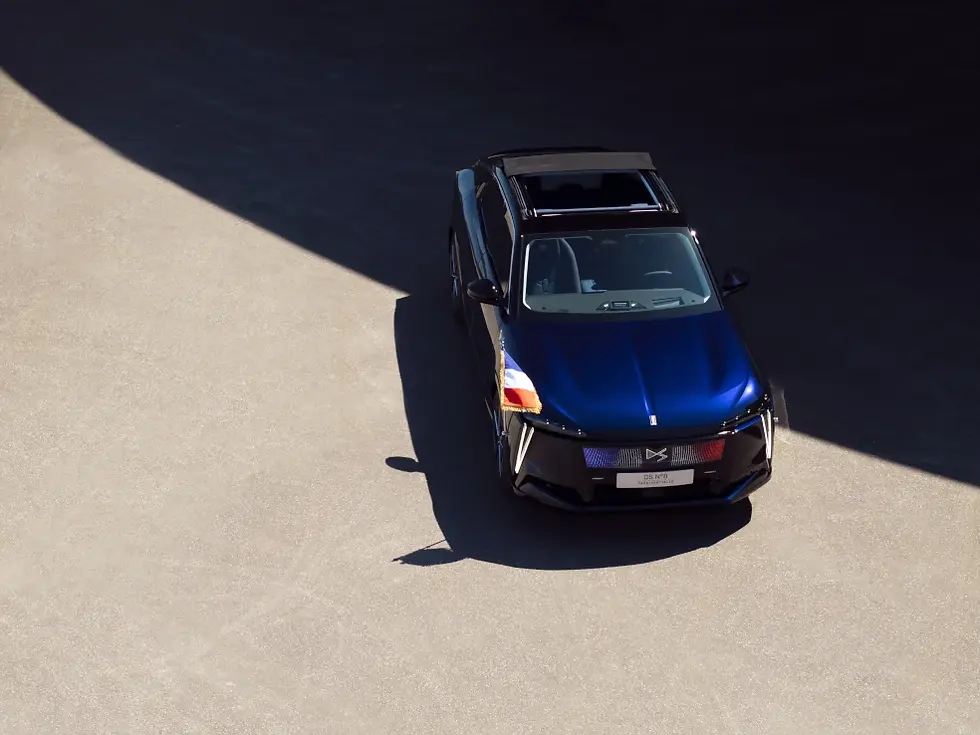Inside the DS N°8's strategy to win over the fleet market
- Jérémy

- Jun 24, 2025
- 4 min read

With the first deliveries expected in the coming weeks, the new flagship sedan from DS Automobiles, known by its project name N°8, is already generating significant buzz. Following a series of press drives that have yielded broadly positive initial reviews, it is time to analyze the positioning of this new model. In a rapidly changing automotive market, one sometimes plagued by doubt regarding electric vehicles, the DS N°8's launch is anything but coincidental. It appears to carry a clear and targeted ambition: to tackle the premium executive sedan segment with a finely tuned strategy, particularly for the professional market. As its German competitors are well-established, let's analyze how this grand French sedan plans to carve out its niche.
A competitive all-electric proposition
The new DS N°8 makes a bold and resolutely forward-looking choice: it will be offered exclusively with 100% electric powertrains. Far from being a risky gamble, this decision seems, on the contrary, to be a well-considered one. The announced power levels and, crucially, the WLTP range figures are expected to be reassuring for high-mileage drivers, who are often a key demographic in this segment. To assess its potential, it is essential to compare it to its two most direct competitors.
The first is the BMW i4. On the European market, it had already won over 15,807 buyers by the end of April. In France, a key European market, 1,140 units were sold as of June 19th. While this figure represents a 28.1% decrease compared to the previous year, it hides a crucial piece of information: the all-electric version accounts for 67.78% of the total sales of the i4 range, which also includes internal combustion engines. This clearly demonstrates that in the premium sedan segment, when the electric offering is compelling and provides a solid range, it is the preferred choice for customers. This is excellent news for the DS N°8.
The second competitor is the Audi Q6 e-tron. Although it is an SUV, its price point and technological positioning place it in direct competition. With 16,297 units sold in Europe by the end of April and 1,639 in France as of June 19th, its market entry is proving promising. Both of these models share similar power and range specifications to what the DS N°8 will offer, but with one major difference: the French sedan is expected to feature a significantly more competitive price tag. This price advantage, combined with high-end features, could be the primary driver of its success.
The B2B market: a growth accelerator for DS
The price argument becomes even more relevant when analyzing the structure of the automotive market, particularly the B2B (Business-to-Business) segment, which encompasses sales to companies and professionals. In the first half of the year, this segment in France accounted for 321,626 vehicles, a colossal 42.91% share of the total French market. More importantly for the DS N°8, this market is electrifying at a breathtaking pace. Electric vehicle sales in the B2B sector have surged by 66.1% to reach 52,279 units, now representing 16.25% of this segment. This makes it an ideal playing field for a new all-electric model.
The competitor figures unequivocally confirm this. In France, a staggering 80.52% of all BMW i4s were registered by professional entities. For the Audi Q6 e-tron, this figure stands at 78.40% (1,285 out of 1,639 units). These overwhelming percentages prove that the core target for these vehicles is the company car and fleet market. For DS Automobiles, which currently makes 36% of its 6,896 sales in France to professionals, the room for growth is therefore substantial.
This is where the DS N°8's strategy truly comes into focus. Thanks to its carefully considered pricing, it should be eligible for government incentives for professionals in key markets like France (the "bonus écologique"). Furthermore, its 100% electric status grants access to major tax exemptions for businesses, particularly concerning company car taxes. This combined financial and ecological advantage is a powerful argument that could persuade many fleet managers to turn to the French contender, offering them a very attractive Total Cost of Ownership (TCO).
Given the sometimes-challenging European environment for electric vehicles, one might be tempted to think that the launch of another large electric sedan will not radically change the game for DS Automobiles. However, a closer analysis of the market reveals a completely different perspective. The B2B segment, which is vital for premium manufacturers, is not just holding steady but is electrifying on a massive scale. The success of its competitors' electric versions, such as the BMW i4, proves that there is strong and solvent demand for prestigious, high-performance, battery-powered company cars, provided the range meets their needs.
Therefore, the DS N°8 is not entering uncharted territory. It aligns perfectly with a fundamental market trend and brings with it decisive competitive advantages: a more accessible price point and eligibility for tax incentives that speak directly to a company's bottom line. By so precisely targeting this growing B2B market, the DS N°8 could not only find its place but also become a genuine engine of growth for the brand, finally allowing it to capture significant new market share in the professional segment. Far from being a simple addition to the lineup, this sedan may well be the cornerstone of DS's future development plan.





Comments